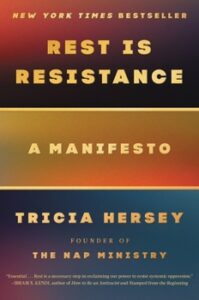
Survival in the Gig Economy
Freedom from the nine-to-five or another form of exploitation? The gig economy is both!
Book gives you the truth about about what to expect and helps you make a plan when nothing is predictable.

Freedom from the nine-to-five or another form of exploitation? The gig economy is both!
Book gives you the truth about about what to expect and helps you make a plan when nothing is predictable.

Tricia Hersey founded her Atlanta-based Nap Ministry in 2016 as part of an art-based project connected to her graduate studies. Hersey created a welcoming “collective resting space” where people in the community had comfortable places to nap for 30-40 minutes. Hersey knew she was on to something when folks told her they could not remember a time when they felt rested. The Nap Ministry morphed into the Resurrect Rest School (2020) and the Rest Is Resistance theory and framework, which focuses on study, teaching and practice that draws from the spirit of community organizing. Hersey argues that a body that is not exhausted or sleep-deprived is a human right that the system denies to the majority of us.
Hersey admonishes that her advocacy involves much more than taking all of our earned vacation days or grabbing a nap in the middle of the day. It is about challenging what she calls “grind culture”—the combined evils of patriarchy, white supremacy, and capitalism—that keeps us running and exhausted. Chronic exhaustion is deliberately designed to keep us from challenging the boot on our neck that keeps us this way, but it also prevents us from tapping our intuition to imagine a better (and much different) world. Rest is the only way we will find the capacity to envision a way out of our current, overworked reality.
Hersey connects our chronic exhaustion to a disconnection from our own bodies. She traces the historical practices of colonialism which has enforced the service of BIPOC and female bodies into serving the systems that oppress them. People of all races and genders are feeling the exhaustion that comes from being asked to work harder for less year after year, but the evil trifecta of white supremacy, patriarchy and capitalism make this much worse for women, people of color, and LGBTQIA.
Although Hersey’s ministry was founded from a theology of Black liberation, it is not just for Black people: “Black liberation is a balm for all humanity and this message is for all those suffering from the ways of white supremacy and capitalism. Everyone on the planet, including the planet itself is suffering from these two systems…White people have had their humanity stripped from them via white supremacy.”
Hersey warns us that teaching our bodies to rest again will take time and practice. There is no standard, one-size-fits-all of resting “practice,” which can including napping, longer baths or showers, short walks outside, listening to music, praying or anything that gets us to “step off the hamster wheel” of productivity. What revolutionary rest is not about is spending time (and money) at expensive spas and retreats catering to the pampered and privileged. Her ministry targets the single working parent, working students, and folks working two and three jobs just to make ends meet—the very folks who are most likely to say they have no time to rest. Rest is not something to be approached in a “trendy, capitalist, consumer-driven” way. Moreover, the purpose of rest is not to recharge and rejuvenate so we can get back to being “productive.”
There is no step-by-step, rigid system, or checklist of quick fixes to the rest revolution. All of us will need to learn how to tap into our bodies and discover what Spirit already knows. We cannot one-minute-manage our way to rest. It will take time to break ourselves from the boxed-in and limited thinking that the system has indoctrinated us into.
However, Hersey provides some suggestions to get us started on the rest journey:
The rest revolution will involve more than learning to care for ourselves. We must also create “systems of community care.” It will require a “trained and conscious community of people” (likely well-rested people) “committed to a cause and ready to fight spiritually for local change.”
As someone who has studied the dysfunction of our work lives and how work does not “work” for most of us, I appreciate Hersey’s work. As a recovering workaholic myself, I am fully on board with her primary argument. However, she advocates rest at the same time calling us to “resist and liberate.” Which is ironically reminiscent of calls during the Vietnam War to “fight for peace.” I have been fighting (or rather, struggling) to advance social justice causes almost as long as Hersey has been alive. Yes, I am exhausted and frequently demoralized.
Rest Is Resistance is a resounding call to lift our noses from the capitalist grindstone and reclaim our human worth and dignity. I would have liked to have seen more about constructing communities of care and how to manage our own energy so we can keep the resistance going. Even coordinating a nation-wide “nap-in” protest will take…energy. Hersey’s theory is spot on, but some of us would like to see more along the lines of practical logistics. Maybe Hersey has a sequel in the works.